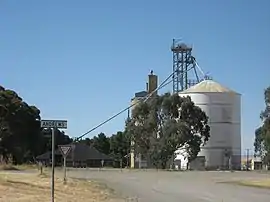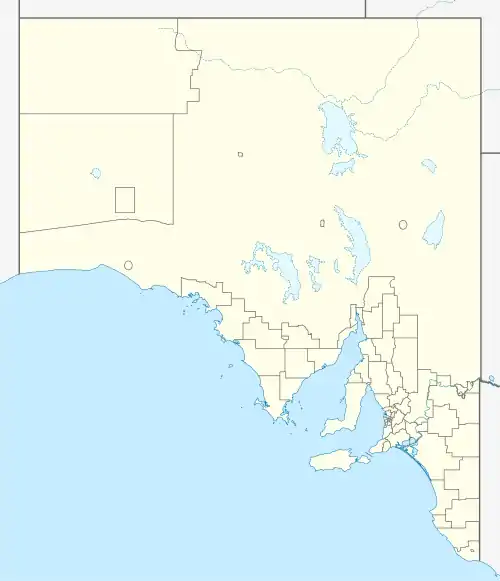Andrews, South Australia
Andrews is a rural locality in the Northern Areas Council of South Australia, located on the Hill River. Its boundaries were formalised in April 2001 for the long established name for the area.[3] The district, which is primarily dedicated to primary production, mainly grain farming, is in the Spalding Ward of the council. The township has bulk grain handling and storage facilities as well as limited sporting and community facilities. The Hill River Road and the Hill River run north–south through the locality, while Andrews Road runs east–west, connecting the Goyder Highway with RM Williams Way.[4] In the 2011 census, the population of Andrews was too low to separately report; it was included in that of adjacent Spalding.[5]
| Andrews South Australia | |||||||||||||||
|---|---|---|---|---|---|---|---|---|---|---|---|---|---|---|---|
 Grain silos at Andrews | |||||||||||||||
 Andrews | |||||||||||||||
| Coordinates | 33.59°S 138.63°E | ||||||||||||||
| Population | 32 (SAL 2021)[1] | ||||||||||||||
| Established | 1864 (hundred proclaimed) 2001 (locality gazetted) | ||||||||||||||
| Postcode(s) | 5454 | ||||||||||||||
| Location |
| ||||||||||||||
| LGA(s) | Northern Areas Council | ||||||||||||||
| State electorate(s) | Stuart[2] | ||||||||||||||
| Federal division(s) | Grey | ||||||||||||||
| |||||||||||||||
The original pastoral leases were thrown open for closer settlement when the Hundred of Andrews was proclaimed on 24 November 1864.[6] The Hundred of Andrews has wider boundaries than the modern locality, also including modern Euromina, Broughton River Valley and the southern section of Spalding.[2] The Hundred was named after Richard Bullock Andrews, a South Australian politician and judge.[7] Most of the original land sales took place in 1865. The section of the Hundred of Andrews north of the northern border of adjacent Euromina became part of the District Council of Spalding when it was first proclaimed in 1885; the remainder would later become part of the District Council of Hutt and Hill Rivers until being merged into the Spalding council in 1935.[8] Andrews Post Office opened circa 1922 and closed on 31 December 1979.[9]
The Northern Areas Council Development Plan states that the "bulk handling and storage facilities at Andrews are of strategic importance to the economy of the State and need to be protected from encroachment by incompatible development", and seeks to avoid "incompatible land uses" in their vicinity.[10]
References
- Australian Bureau of Statistics (28 June 2022). "Andrews (Suburb and Locality)". Australian Census 2021 QuickStats. Retrieved 28 June 2022.
- "Andrews, 5454". Location SA Map Viewer. Government of South Australia. Retrieved 16 February 2016.
- "Placename Details: Andrews". Property Location Browser. Government of South Australia. 16 February 2016. SA0029488. Archived from the original on 12 October 2016. Retrieved 16 February 2016.
- "Andrews SA 5454". Google Maps. Retrieved 16 February 2016.
- "Andrews (GL)". 2011 Census. Australian Bureau of Statistics. Retrieved 16 February 2016.
- "THE GOVERNMENT GAZETTE". South Australian Register. Adelaide. 25 November 1864. p. 3. Retrieved 16 February 2016 – via National Library of Australia.
- "Hundred of Andrews". Property Land Browser. Government of South Australia. Archived from the original on 12 October 2016. Retrieved 16 February 2016.
- "Spalding". Northern Areas Council. Archived from the original on 23 February 2016. Retrieved 16 February 2016.
- "Andrews". Post Office Reference. Premier Postal. Retrieved 16 February 2016.
- "Development Plan – Northern Areas Council" (PDF). Department of Planning, Transport and Infrastructure (SA). Retrieved 16 February 2016.